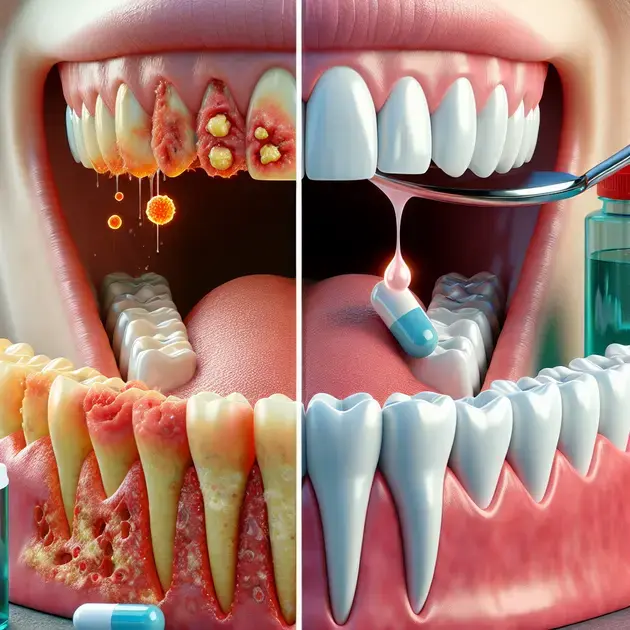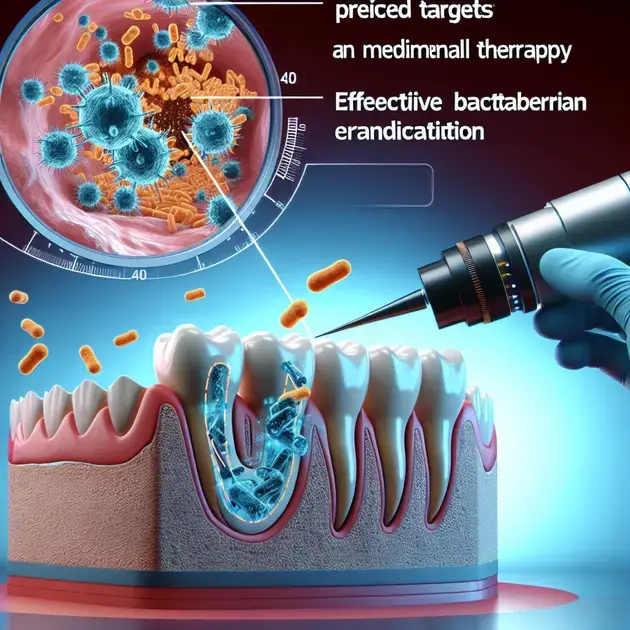Are you struggling with periodontitis and searching for an effective medication to alleviate the symptoms? Look no further! This comprehensive guide will provide you with valuable insights on the most up-to-date treatments available for periodontitis.
Periodontitis is a common chronic inflammatory condition that affects the gums and bone supporting the teeth. If left untreated, it can lead to tooth loss and other serious health implications. Therefore, finding the right medication and treatment plan is crucial in managing and improving your oral health. Let’s explore some of the most effective options together.

Effective Medication for Periodontitis: An Overview
Periodontitis is a severe gum infection that damages the soft tissue and destroys the bone that supports your teeth. It is essential to seek effective medication to manage and treat this condition. There are various medications available, each targeting different aspects of periodontitis. One commonly prescribed medication is antibiotics, such as doxycycline or minocycline, which can help reduce the bacteria causing the infection.
In addition to antibiotics, antimicrobial mouth rinses like chlorhexidine can also be beneficial in controlling the bacterial growth in the mouth. These mouth rinses are often prescribed by dentists for use after dental procedures or to maintain oral hygiene. Another effective medication for periodontitis is enzyme suppressants, which can help prevent the breakdown of gum tissue.
To ensure the effectiveness of your medication, it is crucial to follow your dentist’s instructions carefully. Make sure to take the prescribed dosage at the recommended times and complete the full course of medication. It is also essential to maintain good oral hygiene practices, such as brushing and flossing regularly, to support the treatment process.
When researching information on effective medications for periodontitis, websites like WebMD or the American Dental Association (ADA) can provide detailed insights into different treatment options. Consult with your dentist to determine the most suitable medication for your specific condition and follow their recommendations for optimal results.
Understanding Periodontitis Treatment Options
When it comes to treating periodontitis, understanding the available treatment options is crucial for effectively managing the condition. The treatment approach can vary depending on the severity of the infection and the individual’s oral health. One common treatment option is scaling and root planing, a deep cleaning procedure that removes plaque and tartar from the teeth and roots.
In more severe cases, surgical interventions such as flap surgery or bone grafting may be necessary to repair damaged gum tissue and restore the bone structure. These procedures are usually performed by periodontal specialists and require careful post-operative care to ensure proper healing.
Non-surgical treatments like laser therapy and antibiotic gels are also available for managing periodontitis. Laser therapy involves using a dental laser to remove infected tissue and promote gum regeneration. Antibiotic gels can be applied directly to the gum pockets to combat bacterial growth and reduce inflammation.
To explore detailed information on periodontitis treatment options, websites like Colgate or Healthline offer comprehensive guides on the various procedures and medications used in managing the condition. Consulting with a periodontist or dental professional is recommended to determine the most suitable treatment plan based on your individual needs.
Tips for Choosing the Right Medication
When selecting the right medication for periodontitis, there are several factors to consider to ensure optimal results. Start by consulting with your dentist or periodontist to assess your specific condition and receive personalized recommendations. Based on the severity of your periodontitis, the healthcare professional can guide you towards the most appropriate medication.
Consider any existing medical conditions or allergies you may have before starting a new medication. Some medications may interact with other drugs or exacerbate certain health issues, so it is crucial to provide your healthcare provider with a complete medical history.
Research different medications and their side effects to make an informed decision. Websites like Drugs.com or RxList offer detailed information on medication dosages, interactions, and potential adverse effects. Understanding the medication’s mechanism of action can help you gauge its effectiveness in treating periodontitis.
Follow the prescribed treatment plan diligently and attend regular follow-up appointments with your dentist to monitor the progress of your medication. Be proactive in communicating any concerns or side effects you may experience while on the medication to adjust the treatment if necessary.
By taking these tips into account and actively engaging with your healthcare provider, you can choose the right medication for periodontitis that aligns with your needs and promotes successful treatment outcomes.

Understanding Effective Treatment Plans
When it comes to understanding effective treatment plans for periodontitis, it is crucial to consider a personalized approach for each patient. Periodontitis is a complex condition that requires a comprehensive treatment plan tailored to the individual’s specific needs. This can include a combination of professional dental cleanings, proper oral hygiene practices at home, and possibly medication therapy.
One key aspect of effective treatment plans is ongoing monitoring and evaluation of the patient’s response to treatment. Regular follow-up appointments with the dentist or periodontist are essential to track progress, make any necessary adjustments to the treatment plan, and address any new concerns that may arise.
Education also plays a vital role in effective treatment plans for periodontitis. Patients must be informed about the nature of their condition, the importance of adherence to the treatment plan, and the potential consequences of untreated periodontitis. This can help empower patients to take an active role in managing their oral health.
In some cases, surgical intervention may be necessary as part of the treatment plan for periodontitis. This can range from minimally invasive procedures such as scaling and root planing to more advanced surgical techniques like gum grafting or bone regeneration. The decision to pursue surgical treatment should be based on the individual patient’s needs and the severity of their condition.
Overall, an effective treatment plan for periodontitis should be comprehensive, personalized, and include a combination of professional interventions, patient education, and ongoing monitoring to ensure the best possible outcomes for the patient’s oral health.
Selecting the Right Periodontitis Medication
Choosing the right medication for periodontitis is a crucial step in managing the condition and promoting oral health. There are several types of medications that may be prescribed for periodontitis, including antibiotics, antimicrobial mouth rinses, and locally applied medications such as gels or chips.
When selecting the right periodontitis medication, the dentist or periodontist will consider factors such as the patient’s overall health, the severity of the periodontal disease, and any previous response to treatment. It is essential to follow the healthcare provider’s recommendations regarding medication dosage, frequency, and duration to ensure optimal effectiveness.
Antibiotics are often used in the treatment of periodontitis to help control bacterial infections and reduce inflammation. They may be prescribed as either oral medications or as locally applied agents directly to the affected areas. It is important for patients to finish the full course of antibiotics as prescribed, even if symptoms improve before the medication is completed.
Antimicrobial mouth rinses can also be beneficial in managing periodontitis by reducing the levels of bacteria in the mouth. These rinses are typically used as an adjunct to regular brushing and flossing and can help improve overall oral hygiene and reduce the risk of infection.
In some cases, locally applied medications such as gels or chips containing antimicrobial agents may be recommended for more targeted treatment of periodontal pockets. These medications can help reduce the size of pockets, promote healing, and prevent further progression of the disease.
Overall, selecting the right periodontitis medication is a collaborative decision between the healthcare provider and the patient, based on the individual’s needs and the specific characteristics of their condition. Adherence to the prescribed medication regimen is essential for successful treatment outcomes.
Advantages of Targeted Medication Therapy
Targeted medication therapy offers several advantages for the treatment of periodontitis compared to traditional systemic medications. By delivering medication directly to the affected areas, targeted therapy can provide more precise and effective treatment, minimizing potential side effects and maximizing therapeutic benefits.
One of the key advantages of targeted medication therapy is that it allows for higher concentrations of medication to be delivered directly to the site of infection. This targeted approach can help eradicate bacteria more effectively, reduce inflammation, and promote faster healing of the periodontal tissues.
Another advantage of targeted medication therapy is the ability to customize the treatment to the individual patient’s needs. Different medications and delivery methods can be used based on the severity of the periodontitis, the patient’s overall health, and their response to previous treatments, ensuring a personalized and effective approach to care.
Targeted medication therapy also offers the advantage of convenience for patients, as locally applied medications are often easy to use and require minimal additional steps in the daily oral hygiene routine. This can help improve treatment adherence and overall outcomes by making it easier for patients to incorporate medication therapy into their oral care regimen.
Overall, the advantages of targeted medication therapy for periodontitis include enhanced treatment efficacy, customization to individual patient needs, and improved convenience for patients. By incorporating targeted medication therapy into a comprehensive treatment plan, healthcare providers can optimize outcomes and promote better oral health for their patients.
Conclusion
In conclusion, effective treatment plans for periodontitis require a personalized and comprehensive approach that considers the unique needs of each patient. By combining professional dental cleanings, proper oral hygiene practices, and medication therapy, patients can achieve optimal oral health outcomes. Ongoing monitoring and evaluation, along with patient education, are essential components to ensure successful treatment.
When it comes to selecting the right periodontitis medication, healthcare providers must consider factors such as the severity of the condition and previous treatment responses. Antibiotics, antimicrobial mouth rinses, and locally applied medications play crucial roles in managing periodontitis. Adherence to prescribed medication regimens is key to maximizing effectiveness and promoting oral health.
Targeted medication therapy offers significant advantages over traditional systemic medications in treating periodontitis. By delivering medication directly to the affected areas, targeted therapy can provide precise treatment, minimize side effects, and enhance therapeutic benefits. Customization of treatment, higher concentration delivery, and improved convenience for patients contribute to better treatment outcomes and overall oral health.



